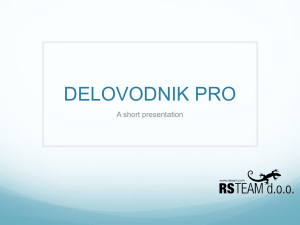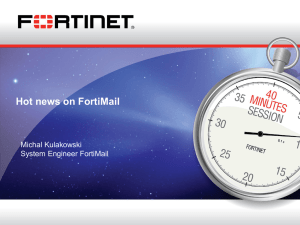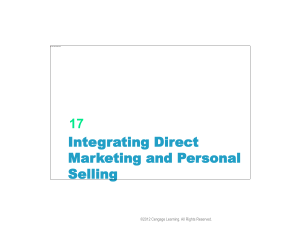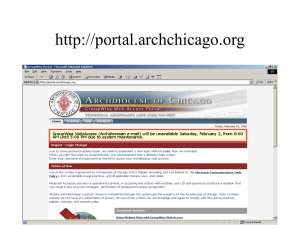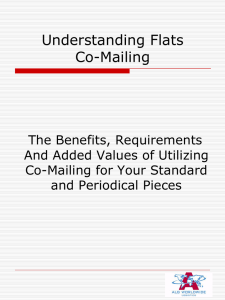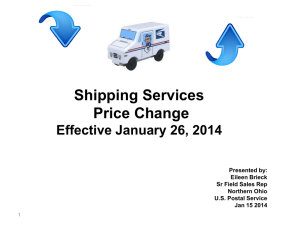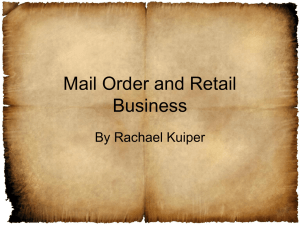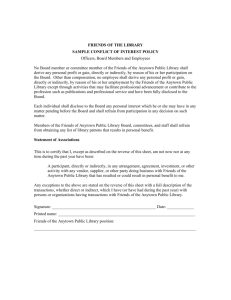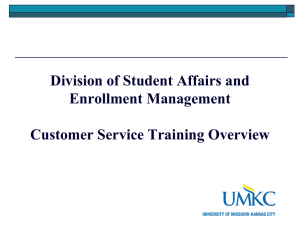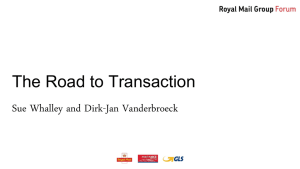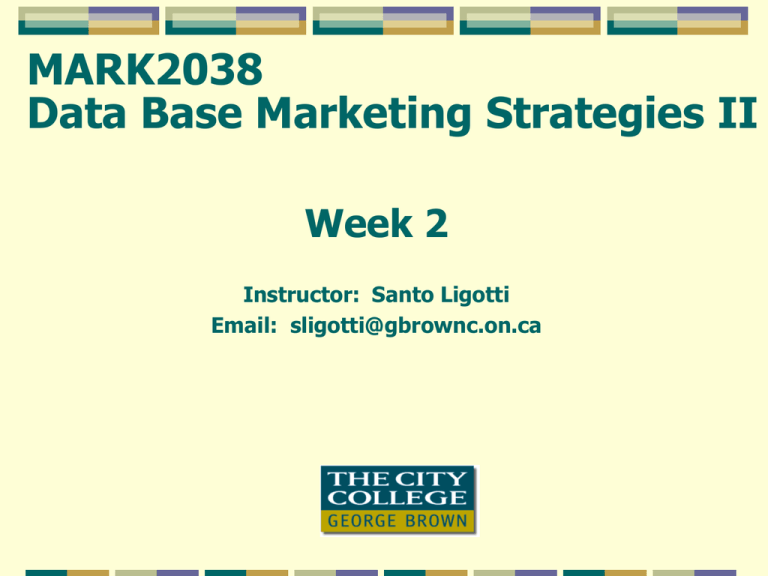
MARK2038
Data Base Marketing Strategies II
Week 2
Instructor: Santo Ligotti
Email: sligotti@gbrownc.on.ca
Today’s Agenda
Housekeeping
Review Course Outline
Reminder: Assignment #1
Distribute Assignment #2
Distribute Self Study Assignment #1
Distribute Self Study Assignment #2
Lecture:
Creative Strategy and Direct Mail
Direct Mail section will be self study
Creative Strategy and
Direct Mail
Learning Objectives
At the end of today, you should be able to:
Creative Strategy-Understanding the creative
development process
• The Art of the Creative Brief
• Direct Mail packages/design/basics
• Writing copy for high response
•
Recall: Database Marketing
Recall: The 3 Direct Marketing
Variables
Creative
Media
Offer
Recall: Creative Strategy
Creative: the
“packaging” of
the offer in
terms of:
Theme
2. Copy
3. Layout
1.
Communication Variables
WHAT do you say?
HOW do you say it?
WHERE do you say it?
WHEN do you say it?
CREATIVE
MEDIA
Successful Creative
Breaks through clutter
Communicates benefits clearly
Supports image/positioning
Makes it easy and compelling to
respond
Has staying power
Creative Brief
Creative brief: a living document that
summarizes the creative strategy of a
firm.
Creative Brief
Five general components:
1.
2.
3.
4.
5.
Customer insight or Target Audience
Communication objectives
Positioning statement
Key messages
Corporate requirements
Customer Insight
1.
2.
3.
4.
5.
6.
7.
Who buys?
What do they buy?
Where do they buy?
When do they buy?
How do they buy?
What motivates them to buy?
How much is the customer willing to pay
(e.g., competitive parity)
Target Audience
Who you are Advertising to
Made up of
Demographics
Psychographic
Geographics
Media Use Patterns
Purchase/ Use Patterns
Demographics
Who they are (married, job type, age,
education, recreation, etc.)
Example:
Our target audience will be men, ages 16 to 25. These men either are in
school or beginning their first job. If they are in High School or College,
many of them are working part-time, service oriented jobs. Once they have
completed school, most of them enter the professional world. They are
living at home or alone for the first time. Paying bills is a new thing to
them. Their income varies from as little are nothing, to $30,000 a year.
These men are very active, participating in extra-curricular activities
(especially sports), these tendencies carry on into their later lives. As target
audience=s age increases, so does their likelihood to own a car, and other
material goods. Most of these young men are either dating or in some form
of relationship, nothing too serious however. Few of these men are seeking
marriage, but they are looking for something long lasting.
Customer Insight
Psychographics
What they think and Feel
Values, Attitudes, and Lifestyles (VALS)
Example:
The target audience is very focused on their lives. They are at a
point where they are creating their future, and are very intent on it
being enjoyable. They do well in school, but their friends are more
important. They go out with them two or more times a week.
These men are also concerned with their looks. They need to feel
attractive to the opposite sex, and spend a lot of their time and
money in that pursuit. Religion is not a big issue in their lives.
Most of them were raised with some form of belief, but they don=t
feel a strong commitment to it. The target audience believes that
the world in at their fingertips, and in most cases it is.
Geographics
Where they live
Example:
These men live in Suburban areas, usually
larger cities of 40,000 or more. These
towns are spread nation wide.
Media Use Patterns
What media they expose themselves to
and how often
Example:
The television is a staple of these men. They spend a lot of time watching
ESPN and other sports shows. They also tune into Jerry Springer, South
Park, Seinfield, and other cereal comedies. Placing ads during these shows
in early evening and night slots would be the best way to reach our target
audiences through the television. Magazines and newspapers are not very
big among this population group. They don=t spend a lot of time reading
because they would rather be doing something active. If they do subscribe
or purchase magazines they would prefer reading Men=s Health, Sports
Illustrated, or other similar magazines. Placing ads in these magazines
would be a good way to promote Certs Powerful Mints.
Media Use Example Con.
Many of these magazines are fitness or health oriented this product
would fit in well with the content. Since these men tend to drive quite
often, placing outdoor advertisements on the way into the downtown
area of the city would be a good way to reach these men. Advertising
on buses would be best if they were placed on the outside. The target
audience may travel the same routes as the buses, but are not likely to
actually ride them. If there is a form of subway, however, in that
particular city advertisements around or on the trains would reach
many of our older target audience members. The best form of media
to use would be the radio. These men listen to alternative or rock
stations. They tune in quite frequently when driving, at home, or even
when they are playing sports or working out. Our target audience
makes themselves available to almost all of the medias, making them
easy to reach.
Purchase and Use Patterns
Where, why, and how often they will
use the product
Where, why, and how often they will
buy the product
Example:
Since impressions are important to these men, they will use this
product often. They will use it when they are on a date or out with
their friends. They can use it anywhere when they are in a
situations where they can=t brush their teeth but still want fresh
breath. They will buy one of two boxes of Certs Powerful Mints a
week. They will pick them up at grocery or convenience stores
where they are displayed near the register.
Positioning Statement
A unique selling proposition (USP)
helps to clearly position the brand in
the consumer mind.
(Desired Action)
“When I _________________,
(Benefit)
I will ____________________
because _________________.”
(Support)
USP Defined
The USP is a statement that defines your business.
It explains what makes you unique and why people
should buy from you. When chooses to buy from
you for the first time, they’re thinking; “With 50
other companies selling the same products and
services as you, why should I do business with you
rather than one of your competitors”
The USP is statement that defines your business.
It explains what makes you unique and why people
should buy from you
Key Messages
The USP should have three qualities:
1.
2.
3.
important
unique
believable
This USP facilitates response in two ways:
1. Creating a need
2. Competitive selling
USP Examples
BMWSheer Driving Pleasure
IKEA-
FEDEXSUBWAY-
Affordable Solutions for
Better Living
When it absolutely,
positively has to get there
overnight
Eat Fresh
Message Strategies: NO USP
When there is no USP or major benefit
to highlight:
Describe the product effectively
Stress superior offer or service you provide
Point out benefits of dealing with your
organization compared to others
Developing Effective
Positioning
Brainstorming:
A process using groups of people to
identify creative solutions to complex
problems.
The Brainstorming Process
1.
Define the problem clearly.
2.
3.
Form a group
Select a leader: takes notes, manages agenda
and time, only allow positive comments, keeps
everyone involved
Set quotas for ideas and time limits for each
agenda item.
Review house rules with participants before
each session.
Creative Stimulators
Creative stimulators: a system used to
stimulate people to think about creative
new solutions to complex problems
using free association.
Creative Stimulators for DM
S
C
A
M
P
E
R
Substitute
Combine
Add or Adapt
Modify
Put to other uses
Eliminate
Reverse
S.C.A.M.P.E.R.
Substitute – replace the familiar theme/situation
with another theme or perhaps an unfamiliar
theme
Combine – mix in popularized concepts to
emphasize benefits of our product
Add or Adapt – describe the added benefits of
our product/in a new way
S.C.A.M.P.E.R.
Modify – modifying time factors in the present
offer
Put to Other Use – link with unrelated
things/situations to emphasize favourable
associations
S.C.A.M.P.E.R.
E
liminate or Simplify – taking away
weight/complexity of message for appeal
R
eversal – reversing the usual situation, e.g.
“man bites dog”
S.C.A.M.P.E.R.
Examples:
SPOON
S.C.A.M.P.E.R.
In Class Exercise:
Working in groups of 3-5, work
with the assigned word and
create alternate use using
SCAMPER
Take 20 minutes, assign a
spokesperson, then present to
the class
What is Direct Marketing Media?
Interactive marketing tools used to get the
customer to respond to and/or stimulate a
transaction directly with the advertiser (rather
than through a retail setting)
Use different standards to evaluate media used
for acquisition vs. retention … why?
What types of Direct Marketing are
you familiar with?
Types of Direct Marketing
Direct mail
Internet applications: e-mail, web, viral, ecommerce, extranet
Telemarketing
Print (e.g. magazine insert cards, newspapers
with toll free #s)
DRTV – direct response TV / radio
Viral marketing
Catalogue
DM Media Response Rates
Medium
Avg. Response Rate*
Direct Mail
Telemarketing – outbound
Newspapers
Magazines
Inserts
DRTV
DR Radio
Websites
Email
1 – 2%
10 – 20% (retention only)
0.01 – 0.1%
0.02 – 0.5%
0.1 – 1.0%
0.01 – 0.05%
0.005%
n/a
low – 2%
* Acquisition programs
Basics of Direct Marketing
Purpose – to get a measurable response that
will produce an immediate or ultimate profit
To get that measurable response there must
be an offer - a “call to action”
What are the 3 key components to producing a
response? What’s the most important?
3 Keys to producing a response
List/media – accounts for 40% of
success
Offer (30%)
Creative execution (30%)
Copy (15%)
Layout (15%)
Reaching the Target: The List
Internal lists
The databases of an organization
Also called house lists
Includes current customers, former
customers and inquiries (i.e. prospects)
Reaching the Target: The List
External lists
Rent from 3rd parties
2 main types :
compiled and response
Reaching the Target: The List
Compiled lists
Rent from list specialists
prepared from telephone directory, public records etc.
Response lists
house lists of other companies
e.g.: credit card holder lists, donor lists (fund-raisers),
magazine subscription lists, buyer lists, attendee/
membership/seminar lists
3 Keys to Producing a Response
The Offer
the totality of what is offered to the customer
and what is expected in return for it
Includes a mix of factors that motivate the
target audience to respond e.g.
product/service, price, payment terms,
incentives etc.
Both offers and incentives are part
of the DM message
The Multi-layered Product
Augmented Product
Incentives
Actual
Product
Packaging
Core
Product
The
Benefit
Guarantees
Brand
Name
Dialogue
Loyalty
Programs
Design
Service
Elements of Promotion:
Creative Execution
Creative Execution
Creative execution = copy + layout (design)
Most direct response copy falls into four categories:
• Benefits - how does the product improve the
customer’s life?
• Descriptive copy
• Support copy
• Sweeteners & facilitators - give more reasons to take
the offer (e.g. incentives, choice, making it easier to
respond/pay)
The Direct Marketing Agency
The specialist in direct marketing
Manages the program for the client from concept
development through execution
Examples:
Draft Worldwide Canada
OgilvyOne Worldwide
Grey Direct
Brann Worldwide
Carlson Marketing Group
Rapp Collins Worldwide
http://directories.marketingmag.ca/bigBookSearch
Direct Marketing Creative Practice
AIDA MODEL
A-Awareness
I-Interest
D-Desire
A-Action
The simplest way for direct marketers to
help in explained how we notice,
internalize, and respond to advertising
• Can be used to evaluate direct media
such as direct mail
•
Direct Marketing Creative Practice
Awareness: How will I get someone to notice my direct
piece of mail when it lands in a pile of bills and other
competitors advertisements?
Outer envelope should play on curiosity, eye settles on middle
of the page
Use of Headlines in the content of the letter
Interest: You need to make sure someone reads your
letter past the first headline, HOW?
Relevant photographs that speak to a story, and the customer
can identify with
Use of Headlines in the content of the letter
Direct Marketing Creative Practice
Desire: How do I get them to reach that emotional level
towards my product, which will ultimately lead them to
buy? Your creative should trigger and foster those feelings,
so HOW?
Testimonials
Descriptions
Tone
Illustrations/Pictures
Action: The customer must be feel that they must act
right away, and to minimize the effort on the part of the
customer in doing so
MAKE IT EASY TO RESPOND
Direct Mail: Introduction & Key
Components
Direct Mail
Direct mail: a direct marketing
medium that uses contracted delivery
services to place a marketing
message into the hands of the
customer/prospect at his/her home or
place of business.
Advantages of Direct Mail
•
•
•
•
•
•
•
Audience selectivity - targeted
High Reach
Geographic flexibility
opportunity to deliver messages to specific
geographic locations
Creative flexibility
choice of creative formats, copy length, colour,
inserts (e.g. coupons, free samples)
Advertiser control (solo direct)
circulation, quality of message
Exclusivity
the only competition is other mail
Measurability – response generated
Disadvantages of Direct Mail
•
•
•
•
•
Low response rates
1 to 2 % industry standard
High cost per exposure
Accuracy of addresses – people always on the
move
Image and lifespan
perceived as junk mail
Time required - 3 months to execute:
3 weeks in mail
4 weeks response window
4-8 weeks post analysis
Common Formats of Direct Mail
Classic package (most popular)
Outer envelope
Letter
Brochure
Response form (with postage paid return envelope)
Post card
Folders
Printed on heavier paper, often with photos, illustrations
Statement stuffers (bounce backs)
Distributed via monthly credit card statements
What factors determines the format used?
Creating Direct Mail Advertising
The Letter
The most important component of the mailing
package
Presents the offer and communicates the sales
method
Goal of the writer: to make appeals that will
satisfy one or more wants of the potential
consumer
Translate key selling points (product features)
into benefits (importance to the consumer)
The Letter - Other Considerations
Versions
Different versions for each major segment
Different version for previous buyers
Personalization
RofT: write as if you know the person fairly well
Postscript
One of the most effective parts of the letter
Restate a key benefit or offer added incentive
Incentives
“Extras” designed to increase response rates (e.g.
discounts, free gift, sample, contest etc.)
The Letter - Other Considerations
Letter length
Don’t be afraid of long copy … but say it well
Short lines: RofT is 85 characters
Letter should be long enough to cover the subject
adequately and short enough to retain interest
Appearance
Attractive, easy to read
Subheadings, underscoring, indent paragraphs, capital
letters, second ink colours etc.
Paragraphs: maximum 7 lines
The Other “Pieces” to the Classic
Mailing Package
The Outer Envelope
One job: to get itself opened
Bright colours, unusual envelopes, interesting graphics
generate interest
Sets tone for your mailing - must harmonize with
contents
The Brochure
Purpose - dramatize the benefits and illustrate the
features of the product or service
Elements - copy, pictures
Has to do a complete selling job
Lift Letter (Publisher’s Letter)
“Not responding? Open this letter”
The Other “Pieces” to the Classic
Mailing Package
The Order Form
Final commitment to buy
Gift Slips & Other Enclosures
Improve response rates by outlining incentives on a
separate slip
The Reply Device
Most important priority: make it easy for the customer
to respond
Clear action requested, state information clearly,
restate the offer, make it clear to read and understand
Include a separate Business reply envelope/card
Common Types of Direct Mail
Addressed mail
Unaddressed mail
Co-op mailings
“Canada Post delivers an average of only two
items of addressed mail and one item of
unaddressed mail daily.”
Source: Canada Post Annual Report
Canada Post Product Lines
Lettermail
Addressed Admail
Dimensional Addressed Admail
Bigger, product samples
GeoPost Plus
Uses PSYTE clusters
Business Reply Mail
In-class Exercise: Selling Points vs.
Benefits
Example: Maytag Portable Countertop Dishwasher
Translate the following selling points into product
benefits.
Selling Point = Features
A 10-minute operating cycle
Measures 18” in diameter
Has a transparent plastic top
Has a universal hose
coupling
Benefit = Important to
Consumer
In-class Exercise: Selling Points vs.
Benefits
Example: Maytag Portable Countertop
Dishwasher
Translate the following selling points into
product benefits.
Selling Point = Features
A 10-minute operating cycle
Measures 18” in diameter
Has a transparent plastic top
Has a universal hose coupling
Benefit = Important to Consumer
Time to spend on other things
Saves valuable floor space
Know when wash is done
Easy to use/move – attaches &
detaches in seconds
The Copy Platform
Copy Platform
Great results start with great copy.
Most copy falls into four categories:
Benefits
2. Description
3. Support copy
4. Sweeteners and facilitators
1.
Copy Appeals & Basic Human Wants
What is it about your offer and benefit story
that is most appealing?
Most people are motivated to respond for one
of two reasons:
To gain something; OR
To avoid losing something
What are some examples?
Writing Great Copy
Know the product
Know the market
Don’t talk “up” or talk “down”
Promise… then deliver
Make the most important point first
Copy, heads, subs, paragraphs
relevant to the selling proposition …
always.
Writing Great Copy
Be concise, but tell the story
Be logical and clear with good flow and
transitions
Show your enthusiasm (if this matches the
tone)
Be thorough- does the copy answer all the
questions?
Make sure the copy is designed to sell (not
showcase)
Eleven Guidelines to Good Copy
Know the product
Know the market
Talk in language the consumer will understand
Make the most important point first
Making a promise? … then prove you can deliver on it
Copy (especially headline and lead paragraph) relevant to the selling
proposition?
Be concise - don’t overwrite
Be logical and clear - ensure flow from point to point
Show your enthusiasm - does the writer believe in what he/she is selling?
Be thorough - ensure all questions are answered
Ensure the copy is designed to sell (not showcase)
The Seven-Step Formula for
Winning Letters
1.
2.
3.
4.
5.
6.
7.
Promise your most important benefit in your
headline or first paragraph
Immediately enlarge on our most important
benefit
Tell readers specifically what they are going to
get
Back up your statements with proof and
endorsements
Tell readers what they might lose if they don’t
act
Rephrase your prominent benefits in your
closing offer
Incite action … now.
Ten Powerful Words
YOU
NOW
TODAY
FREE
NEW
WIN
EASY
BONUS
MEMBER
TRY
Avoid the use of:
passive tense
humour
semicolons
lengthy paragraphs
(>7 lines)
block text (left-andright justified)
Format considerations
Letter length
Appearance
The post script
Versioning
Personalization
Great envelopes
Get the mail opened
Use colour, windows, decals, odd shapes, etc. to
stand out
Leave the bottom 15 mm clear
are Canada Post preferred size
Most prestigious envelope is C4 window face
Entice rather than reveal
Avoid trying to trick your audience
Great brochures
Enhance the credibility of the letter
2. Tell the story of your product/offer
3. Include:
1.
Headlines that communicate
Charts, diagrams, pictures
Detailed descriptions for technical products
Testimonials to reinforce your claims
Description of risk-reduction mechanisms
The response device
Don’t count on the
letter alone to make
the sale!
Call-to-action must be
simple.
Direct customer to
complete order form,
mail BRE, redeem
coupons, call toll-free
numbers, visit a
promotional web site,
etc.
Case: American Heart
Association
The American Heart Association needed
to raise more funds for its health
improvement activities at lower cost.
Seven new copy approaches were
developed for a new DM campaign
alternate “teaser” copy on OE
Response to each version was tested
Mockups follow…
NONPROFIT ORG
U.S. POSTAGE
PAID
Permit No. 35193
Los Angeles, Calif.
Example: American Heart
Association
MR. JOHN SMITH
123 ANYSTREET
ANYTOWN, AA
00000
(control)
NONPROFIT ORG
U.S. POSTAGE
PAID
Permit No. 35193
Los Angeles, Calif.
Example: American Heart
Use the enclosed FREE GIFT.
Association
MR. JOHN SMITH
123 ANYSTREET
ANYTOWN, AA
00000
You may save a life!
NONPROFIT ORG
U.S. POSTAGE
PAID
Permit No. 35193
Los Angeles, Calif.
Example: American Heart
Emergency Heart Attack Card
Association
Enclosed.
MR. JOHN SMITH
123 ANYSTREET
ANYTOWN, AA
00000
NONPROFIT ORG
U.S. POSTAGE
PAID
Permit No. 35193
Los Angeles, Calif.
Example: American Heart
4 years ago Billy Thompson’s
Association
dad would have
died…
MR. JOHN SMITH
123 ANYSTREET
ANYTOWN, AA
00000
NONPROFIT ORG
U.S. POSTAGE
PAID
Permit No. 35193
Los Angeles, Calif.
Example: American Heart
If you have ever worried about
having a heartAssociation
attack…
MR. JOHN SMITH
123 ANYSTREET
ANYTOWN, AA
00000
NONPROFIT ORG
U.S. POSTAGE
PAID
Permit No. 35193
Los Angeles, Calif.
Example: American Heart
We’d like to show you how you can help save a life.
Association
YOURS.
MR. JOHN SMITH
123 ANYSTREET
ANYTOWN, AA
00000
NONPROFIT ORG
U.S. POSTAGE
PAID
Permit No. 35193
Los Angeles, Calif.
Example: American Heart
You hold lives in your hands… TODAY!
Association
MR. JOHN SMITH
123 ANYSTREET
ANYTOWN, AA
00000
…and THAT’S IMPORTANT!
Case: American Heart
Association
Questions:
• Explain the
rationale
for each
copy
approach.
Case: American Heart
Association
The best package:
6.
We’d like to show you how you can help
save a life. YOURS.
Good packages:
4.
3.
If you have ever worried about having a
heart attack…
4 years ago Billy Thompson’s dad would
have died…
Poor packages:
1.
5.
7.
2.
Use the enclosed FREE GIFT.
You hold lives in your hands… TODAY! AND
THAT’S IMPORTANT!
No teaser copy.
Emergency Heart Attack Card Enclosed.
• Do you
agree with
the test
results for
the “best”
package?
Case: American Heart
Association
The best package:
6.
We’d like to show you how you can help
save a life. YOURS.
Good packages:
4.
3.
If you have ever worried about having a
heart attack…
4 years ago Billy Thompson’s dad would
have died…
Poor packages:
1.
5.
7.
2.
Use the enclosed FREE GIFT.
You hold lives in your hands… TODAY! AND
THAT’S IMPORTANT!
No teaser copy.
Emergency Heart Attack Card Enclosed.
• Create
three more
teasers that
would be
effective.
A Final Word …
Integrated Communications
Direct marketing should be integrated
as part of an overall campaign strategy
with advertising, internet marketing,
sales promotion and PR
Campaigns should have the same
tonality, creative direction and strategic
direction
Levering the Internet for
response

